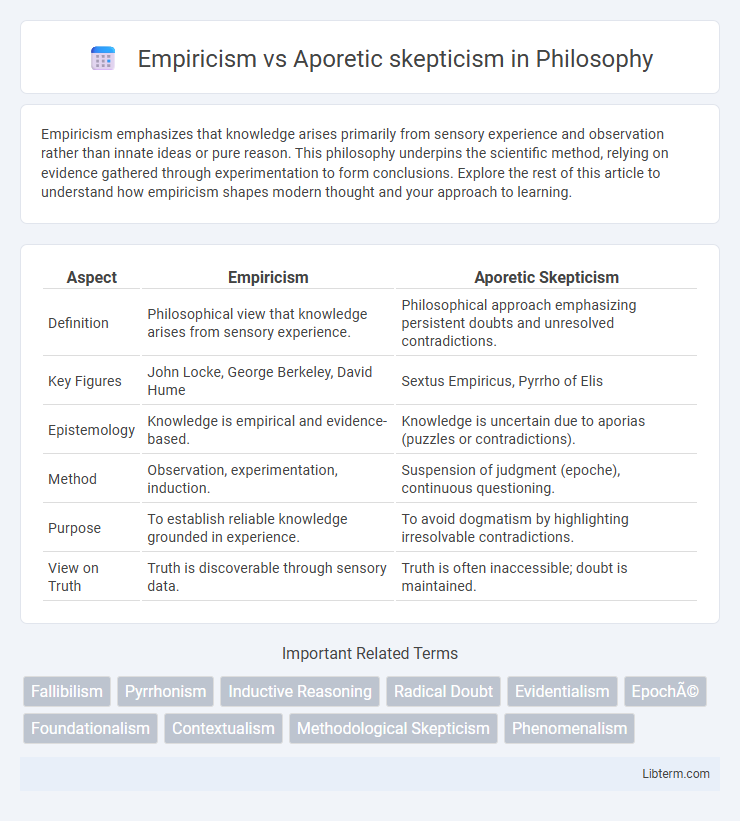Empiricism emphasizes that knowledge arises primarily from sensory experience and observation rather than innate ideas or pure reason. This philosophy underpins the scientific method, relying on evidence gathered through experimentation to form conclusions. Explore the rest of this article to understand how empiricism shapes modern thought and your approach to learning.
Table of Comparison
| Aspect | Empiricism | Aporetic Skepticism |
|---|---|---|
| Definition | Philosophical view that knowledge arises from sensory experience. | Philosophical approach emphasizing persistent doubts and unresolved contradictions. |
| Key Figures | John Locke, George Berkeley, David Hume | Sextus Empiricus, Pyrrho of Elis |
| Epistemology | Knowledge is empirical and evidence-based. | Knowledge is uncertain due to aporias (puzzles or contradictions). |
| Method | Observation, experimentation, induction. | Suspension of judgment (epoche), continuous questioning. |
| Purpose | To establish reliable knowledge grounded in experience. | To avoid dogmatism by highlighting irresolvable contradictions. |
| View on Truth | Truth is discoverable through sensory data. | Truth is often inaccessible; doubt is maintained. |
Introduction to Empiricism and Aporetic Skepticism
Empiricism emphasizes knowledge derived from sensory experience and observation, asserting that all ideas originate from perceptual input, notably advanced by philosophers like John Locke and David Hume. Aporetic skepticism involves the systematic suspension of judgment due to contradictory evidence and unresolved philosophical problems, tracing back to Pyrrhonian skepticism and Sextus Empiricus. Both frameworks address the limits of human knowledge but diverge on epistemic certainty, with empiricism seeking empirical foundations and aporetic skepticism embracing persistent doubt.
Core Principles of Empiricism
Empiricism centers on the principle that knowledge originates primarily from sensory experience, emphasizing observation and experimentation as the foundation for understanding reality. Core principles include the rejection of innate ideas, reliance on empirical evidence for justification, and the use of inductive reasoning to form generalizations from specific instances. This approach contrasts sharply with aporetic skepticism, which questions the possibility of certain knowledge and often suspends judgment due to perceived contradictions or unresolved problems.
Fundamental Tenets of Aporetic Skepticism
Aporetic skepticism centers on the fundamental tenet that systematic doubt leads to epistemic suspension by highlighting contradictions and uncertainties in knowledge claims. This form of skepticism emphasizes the aporia, or perplexity, arising when opposing arguments appear equally plausible, preventing firm conclusions. Unlike empiricism, which relies on sensory experience as the basis for knowledge, aporetic skepticism questions the possibility of attaining absolute certainty through any method.
Historical Origins and Key Philosophers
Empiricism, rooted in the 17th-century works of John Locke, George Berkeley, and David Hume, emphasizes knowledge derived from sensory experience and observation. Aporetic skepticism traces back to ancient Greek philosophers like Pyrrho of Elis and Sextus Empiricus, highlighting persistent doubt and the suspension of judgment to achieve mental tranquility. The contrast between empiricism's reliance on evidence and aporetic skepticism's embrace of unresolved inquiry shapes foundational debates in epistemology.
Methods of Acquiring Knowledge: Empirical Evidence vs Skeptical Inquiry
Empiricism emphasizes acquiring knowledge through direct observation, experimentation, and sensory experience, relying heavily on empirical evidence to validate claims. Aporetic skepticism prioritizes methodical doubt and persistent questioning, suspending judgment to reveal contradictions and limitations in knowledge claims without accepting empirical data as conclusive. The contrast lies in empiricism's trust in sensory data as a foundation for knowledge versus aporetic skepticism's focus on continuous inquiry to expose uncertainties and promote intellectual humility.
Epistemological Implications: Certainty and Doubt
Empiricism emphasizes knowledge derived from sensory experience, asserting that certainty is attainable through observation and evidence, which grounds epistemology in empirical data. Aporetic skepticism challenges this by highlighting persistent doubt and epistemic uncertainty, questioning whether absolute certainty is ever achievable. The tension between these perspectives shapes epistemological debates, forcing a reconsideration of knowledge claims and the limits of human understanding.
Major Debates and Philosophical Controversies
Empiricism, championed by philosophers like John Locke and David Hume, asserts that knowledge derives primarily from sensory experience, emphasizing observation and experimentation as foundations for understanding reality. In contrast, aporetic skepticism, rooted in ancient Pyrrhonian philosophy, challenges the possibility of certain knowledge by systematically exposing contradictions and unresolved problems, leading to suspension of judgment (epoche). The major debate centers on whether empirical evidence can overcome skeptical doubts or if skepticism's persistent aporia reveals intrinsic limits of human cognition, fueling ongoing philosophical controversies about the nature and scope of knowledge.
Strengths and Limitations of Empiricism
Empiricism excels in grounding knowledge in sensory experience, enabling practical and testable conclusions through observation and experimentation. Its strength lies in generating reliable, evidence-based information, crucial for scientific advancement and technological innovation. However, empiricism is limited by its reliance on sensory data, which can be subjective or incomplete, and it struggles to address metaphysical questions or concepts beyond empirical verification.
Challenges Posed by Aporetic Skepticism
Aporetic skepticism challenges empiricism by questioning the certainty and reliability of sensory knowledge, highlighting inherent contradictions and unresolved doubts in human cognition. It undermines empirical claims by exposing how sensory experiences can be deceptive or insufficient for attaining absolute truth. This skepticism forces empiricists to defend the foundations of knowledge and address the limitations of observation and experimental verification.
Contemporary Relevance and Comparative Analysis
Empiricism, emphasizing knowledge through sensory experience, continues to underpin scientific methodologies and technological advancements in contemporary research. Aporetic skepticism, which engages with unresolved contradictions and persistent doubt, challenges empirical claims by highlighting cognitive limitations and promoting intellectual humility in epistemology. Comparative analysis reveals that while empiricism drives evidence-based progress, aporetic skepticism ensures critical reflection, preventing dogmatism and fostering ongoing philosophical inquiry.
Empiricism Infographic

 libterm.com
libterm.com